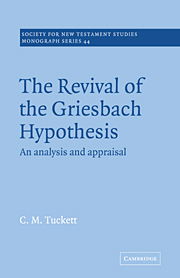Part I - Some Aspects of the History of the Study of the Synoptic Problem
Published online by Cambridge University Press: 18 January 2010
Summary
All the proponents of the Griesbach hypothesis (GH) in its contemporary revival are well aware that they are advocating nothing new. The hypothesis itself was first put forward in 1764 by Henry Owen, but its present name derives from its adoption by J. J. Griesbach at the end of the eighteenth century. However, during the second half of the nineteenth century, it was generally discounted in favour of the theory of Markan priority, and since then it was only rarely advocated until 1964. The major part of W. R. Farmer's book, The Synoptic Problem, is devoted to analysing some of the history of the study of the Synoptic Problem over the last two hundred years, looking in particular at the way in which the GH was gradually rejected, and the two-document hypothesis (2DH) adopted, by nearly all scholars. The implication drawn is that an analysis of the history of research may offer some justification for reviving the GH and reconsidering its merits in the modern discussion.
One of the results of Farmer's historical survey is the claim that extrascientific factors were at work in the establishment of the 2DH, and in this respect the recent work of H. H. Stoldt has come to similar conclusions. The most significant developments occurred initially in Germany in the early part of the nineteenth century, where there was a growing consensus, following the work of Sieffert, that Matthew's gospel was written after the eye-witness period.
- Type
- Chapter
- Information
- Revival Griesbach Hypothes , pp. 3 - 8Publisher: Cambridge University PressPrint publication year: 1983



